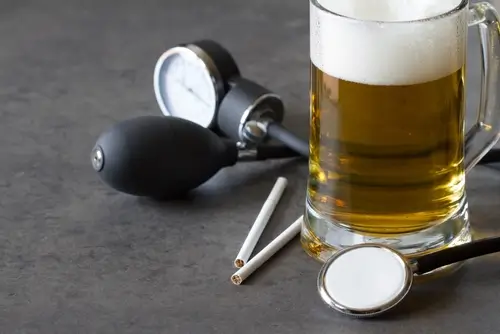Alcohol addiction, also known as alcoholism, is a chronic disorder described by the compulsive and uncontrollable usage of alcohol, affecting millions of people worldwide. Despite its prevalence, many people do not fully understand the nature of addiction and its associated dangers.
Stimulants and depressants are substances that can badly impact an individual’s central nervous system.
Stimulants are drugs that increase activity in the brain and central nervous system. They work by stimulating the production and release of certain neurotransmitters in the brain.
Common examples of stimulants include:
- Nicotine
- Caffeine
- Cocaine
- Amphetamines
- Methamphetamine
Depressants are treatments that slow down brain activity and suppress certain neurotransmitters. Depressants are also known as sedatives or tranquilizers. They can produce feelings of relaxation, reduce inhibitions, and impair judgment and coordination.
Common examples of depressants include:
- Opioids
- Alcohol
- Barbiturates
- Benzodiazepines
In this article, we will learn the relationship between alcohol and addiction. It will also discuss the unique facts that can help individuals understand the complex nature of addiction.

Is Alcohol A Stimulant?
Contrary to popular belief, alcohol is classified as a depressant, not a stimulant. Alcohol slows down activity in the brain and central nervous system. Alcohol addiction results in feelings of relaxation and reduced inhibitions.
However, in certain situations, alcohol can act as a stimulant, such as in small doses or when combined with other substances. Using alcohol as a stimulant can be dangerous and lead to addiction and other health problems.
Alcohol as a stimulant
While alcohol is primarily classified as a depressant, it can also act as a stimulant in certain situations. For example:
- Low to moderate doses of alcohol: This can produce feelings of euphoria, increased sociability, and reduced inhibition. It may lead some individuals to perceive alcohol as a stimulant.
- Higher doses of alcohol: Alcohol’s depressant effects become more pronounced with high amounts of alcohol. It may lead to sedation, impaired coordination, and potentially dangerous consequences such as respiratory depression and loss of consciousness.
Alcohol as a depressant
Alcohol is classified as a depressant, which slows down brain activity and suppresses certain neurotransmitters. It works by:
- Decreasing the activity of glutamate. Glutamate is a neurotransmitter with excitatory effects on the brain.
- Increasing the activity of GABA (gamma-aminobutyric acid), a neurotransmitter that calms the brain.
Effects Of Stimulants & Depressants
While stimulants and depressants have different effects on the body, they can both be addictive and have the potential for substance abuse. Long-term usage of stimulants and depressants can lead to addiction, physical dependence, and tolerance. This may require professional addiction treatment.
- Use alcohol in moderation and avoid using it to achieve a stimulant-like effect.
- Only use prescription drugs (stimulants and depressants) as prescribed by a medical professional to prevent misuse and abuse.
Alcohol In Moderation
Always consume alcohol in moderation since it can negatively affect physical and mental health. Stimulants affect the brain and body by increasing levels of dopamine and norepinephrine, which can increase heart rate and blood pressure and lead to respiration issues, decreased appetite, and fatigue.

Health Risks Associated With High Doses Of Alcohol
Drinking too much alcohol regularly can enhance the risks of growing chronic health conditions such as high blood pressure, liver disease, and certain cancers. It can also lead to alcohol dependency and addiction, which can have devastating effects on an individual’s life and relationships.
In addition to physical health risks, excessive alcohol consumption can adversely affect mental health. Alcohol is a depressant and can exacerbate symptoms of anxiety and depression. It can also cause impairment of judgment and lead to risky behaviors, resulting in accidents, injuries, and legal problems.
Benefits Of Moderate Alcohol Consumption
Moderate alcohol usage has been linked to certain health benefits. The key is to drink alcohol in moderation, described as two drinks or less per day for men or one drink or less per day for women. By practicing moderation and being mindful of their alcohol consumption, individuals can reduce their risk of negative consequences and enjoy the potential benefits of moderate drinking.
5 Facts About Alcohol Addiction
Alcohol addiction is a complex condition that affects millions of people worldwide. While many know the dangers of excessive alcohol consumption, many misconceptions and misunderstandings exist about alcohol addiction. Let’s discuss five about alcohol addiction that highlight the severity of the disease and the importance of seeking addiction treatment.
#1 Addiction is a disease.
The condition of addiction is a disease that impacts the brain, altering an individual’s thoughts and behaviors. It can cause several health issues, including heart disease, cancer, stroke, and liver disease. It may weaken the immune system, making individuals more susceptible to infections.
#2 Genetics play a role in the alcohol addiction cycle.
Addiction is a family disorder, one person may be addicted to it, but all family members suffer. Studies have shown that genetics make up about 50% of the risks for alcohol addiction. Specific genes may affect the way the body metabolizes alcohol. It makes some individuals more susceptible to alcohol addiction than others. Additionally, individuals with a family background of alcohol addiction are likelier to develop the condition.
#3 Alcohol withdrawal can be dangerous.
Addiction may start with a choice, but it ends with a disease. Alcohol addiction is a physical as well as psychological dependence on alcohol. Withdrawal from alcohol can be dangerous and even life-threatening. Signs of alcohol withdrawal can include severe dehydration, hallucinations, seizures, delirium tremens, and more.
#4 Addiction can lead to physical changes in the brain.
Long-term use of alcohol can cause physical changes in the brain. It includes a decrease in the size of the brain’s grey matter and an enhancement in the size of the brain’s ventricles. These changes can result in cognitive impairment, memory problems, and other mental health issues.
#5 Treatment for addiction is available.
Addiction is a disease that doesn’t discriminate, but recovery is a journey that can transform lives. Various treatment options are available for alcohol addiction, including detoxification, medication, and behavioral therapies. Treatment can help individuals overcome their addiction and improve their health and well-being.
Here’s another comprehensive guide so you can gain a deeper understanding of this complex issue.

Sobriety At Launch Centers In Los Angeles
Sobriety is a challenging journey, but Launch Centers in Los Angeles, California, can provide the support and resources needed to achieve lasting recovery.
We offer a variety of evidence-based treatments and therapies, including trauma-informed care, cognitive-behavioral therapy, and relapse prevention techniques. With a focus on individualized care, our experienced team can create a personalized treatment plan that addresses each client’s recovery goals.
If you or your loved one is struggling with addiction, don’t hesitate to contact Launch Centers for help. The center’s compassionate and knowledgeable staff are available 24/7 to answer any questions and support during this difficult time.
With the right addiction treatment, lasting recovery is possible. Contact us today to learn about our programs.





